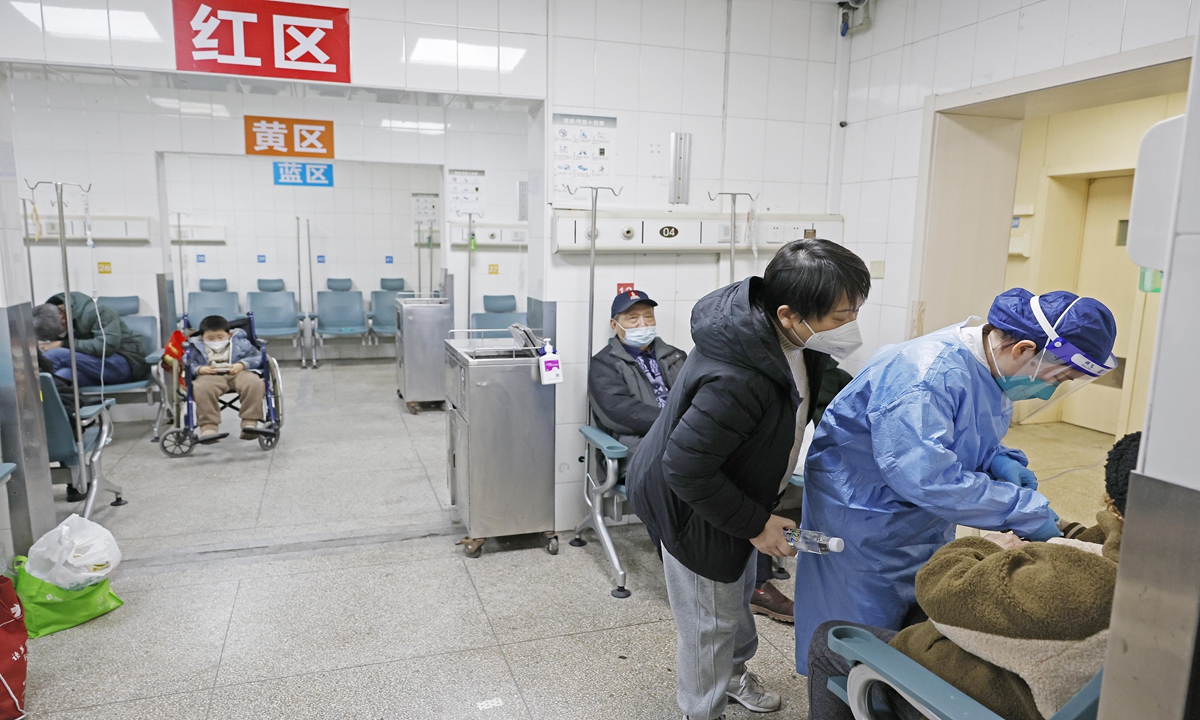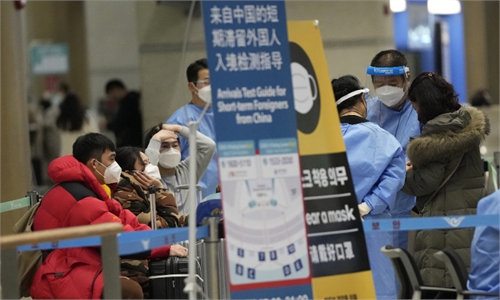China steps out of latest COVID-19 wave as weekly death tolls halved; epidemic rebound 'expected in June, July'

A medical worker pulls out a needle for a patient at the infusion room of the emergency department of Tongji Hospital in Shanghai at the Chinese New Year's Eve on January 21, 2023. Photo: IC
China's COVID-19 related death tolls halved from the previous weekly total of 6,364 to the most recent week's 3,278. A sharp decline in deaths and the downward trend of COVID-19 infections indicate that China has stepped out of the current wave, observers said on Sunday.
China on Saturday reported 3,278 COVID-related deaths across 31 provinces and regions between January 27 and February 2, including 131 deaths caused by respiratory failure and 3,147 deaths from underlying diseases combined with COVID infections, according to a statement released by the Chinese Center for Disease Control and Prevention (China CDC).
Weekly deaths between January 20 and January 26 stood at 6,364, the China CDC data showed.
"China has stepped out of this current wave of COVID-19, with the numbers of infections, severe cases and deaths showing downward trends and hospitals across the nation have resumed normal operations," an expert from the China CDC, who requested anonymity, told the Global Times on Sunday.
The infection peak across provinces has passed. The 3,000 deaths reported between January 27 and February 2 were among those who got infected in mid-January, rather than recent infections, the expert said.
According to the official data released by China CDC, COVID-19 infections peaked at 6.94 million on December 22 with new daily cases decreasing to 15,000 on January 23 and then rising slightly to 24,000 on January 30. The positive infection rate dropped to 2.5 percent on January 30 after it peaked at 29.2 percent on December 25.
The China CDC data also showed the numbers of outpatients, severe cases in hospital and deaths in hospital were all trending downwards.
There was no obvious rebound during or after the week-long Chinese New Year holidays when tens of millions of people reunited for family gatherings and then returned to work at the new beginning of the Year of the Rabbit. Data reported across provinces also confirmed the country's latest wave of COVID-19 infections has come to an end.
The epidemic peak has passed, and it is at a low level in Hunan Province. The epidemic situation in all regions shows a downward trend, and there is no rebound, said Tong Yeqing, an expert from Central China's Hunan provincial disease prevention and control center, recently. Since the response of COVID-19 has been downgraded, lives of the locals returned to normality during the Spring Festival holidays, Tong added.
"During the Spring Festival, the numbers of positive cases and severe patients in hospitals in Sichuan Province continued to decrease, and there weren't overwhelmed treatment among hospitals and insufficient medical resources," the expert teams of the Sichuan provincial health commission said.
Stepping out of this wave of the epidemic doesn't mean that the COVID-19 is over. Because of the possible emergence of new variants and waning antibody levels among the populations, China is expected to see a fresh wave of epidemic rebound around June or July, the anonymous CDC expert warned.
It is estimated that 80 percent of the capital's population were infected with COVID-19 during the recent wave, so a robust hybrid immunity generated by natural infection and vaccines has already formed, Zeng Guang, former chief epidemiologist of the Chinese CDC, told the Global Times previously.
Immunity generated by natural infections will fade within five or six months, according to international data, but it will protect people from suffering from severe symptoms or deaths for a long time.
The next wave is unlikely to match what the country experienced in December. The next wave won't overwhelm the medical system and won't have as many as severe cases, the anonymous CDC expert told the Global Times.
In a bid to deal with the next wave, many provinces have started to conduct antibody investigations, and some provinces have set up mobile apps to collect antigen testing results provided by the public where people can upload their testing results on a voluntary basis.
As the Spring Festival and Lantern Festival holidays are drawing to a close, schools across the country will begin to resume classes. The National Health Commission issued a guidance saying that on-site classes in campuses with no record of an epidemic can operate normally but for those where the epidemic is still ongoing, they should be under closed-off management.
The presence of negative testing results for entering and exiting universities and schools is not mandatory. Universities are not required to conduct mass nucleic acid testing anymore, but they should set up fever clines that operate 24/7 to handle possible infections, the guidance noted.
"Schools are special places that are crowded and lack conditions for social distancing, so students should remain cautious and wear masks properly to prevent large-scale outbreaks," the anonymous CDC expert noted.




